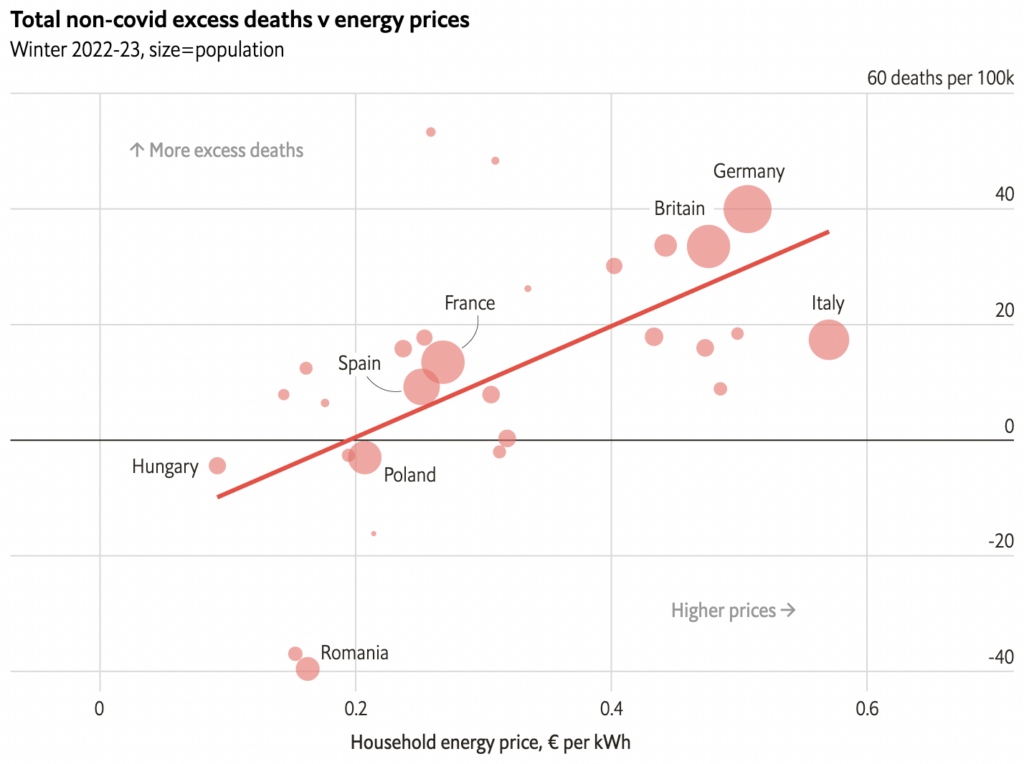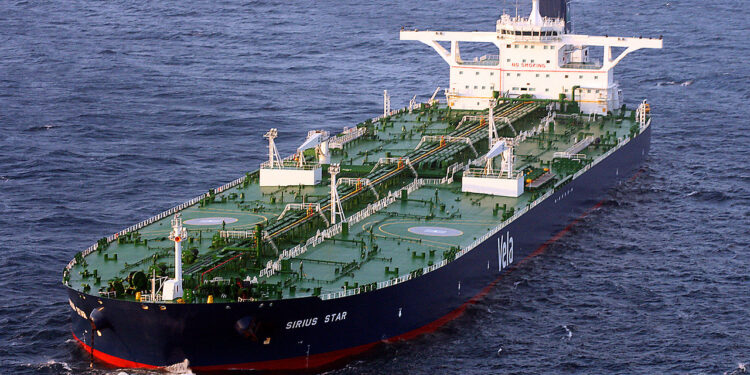Last winter’s energy crisis was much less bad than many had predicted – thanks in large part to unusually warm weather. Indeed, 2022-23 was Europe’s “joint-second warmest winter on record”, so demand for natural gas was much lower than it might have otherwise been.
However, it was still cold and people still had to heat their homes. Yet according to the Economist, high gas prices discouraged many Europeans from doing so, leading to 68,000 excess deaths across the continent. The magazine had actually predicted that this would happen and was proven correct – or so it claims.
How did its analysts get to the figure of 68,000? They begin by noting that there were 149,000 excess deaths between November 2022 and February 2023 – which is 8% higher than the five-year average from 2015-2019. About 60,000 were officially recorded as Covid deaths, so these were subtracted from the total.
They then looked to see whether energy prices were correlated with the non-Covid excess deaths rate across European countries, and found that they were – as shown in the chart below.

There’s a strong positive association between energy prices and non-Covid excess deaths per 100,000. Note that Britain had among the highest energy prices and among the highest non-Covid excess deaths.
The Economist ran a model controlling for various factors, and found that “a price rise of around €0.10 per kwh” was associated with “an increase in a country’s weekly mortality of around 2.2%”. Which implies that if energy prices had not risen, there would have been 68,000 fewer deaths in Europe.
Now, I have one quibble with their methodology: they appear to have used the absolute number of excess deaths per 100,000 as their outcome measure – which doesn’t really account for ageing and ‘rewards’ countries with lower birth rates. However, the biases aren’t huge, and it’s unlikely to have seriously affected their analysis. (The true figure might be 10-15% lower.)
Incidentally, they also estimate how many lives were saved by energy subsidies, and come up with a figure of 26,600. Given that subsidies were on the order of €600 billion, that works out to around €25 million per life saved – well-above standard estimates of the ‘value of a statistical life’.
The rise in energy prices last year was partly due to uncertainty sparked by Russia’s invasion, and was therefore probably inevitable. However, it was also due to Europe’s self-imposed sanctions on Russian energy, along with Russia’s decision to cut gas supplies (before the Nord Stream sabotage).
As the Spectator noted in a recent editorial, the sanctions on Russia have largely failed. They haven’t stopped Russia waging war let alone “turned the rouble to rubble”. And they’ve helped the Chinese, our supposed rivals, who’ve been able to buy energy at a discount.
On top of all that, it seems, they got elderly Europeans killed.











To join in with the discussion please make a donation to The Daily Sceptic.
Profanity and abuse will be removed and may lead to a permanent ban.
Instead of sanctions, the West should have moved to improve supply of fuels. That would have caused prices to fall and seen Russian revenues slump, crippling Putin’s war machine. Fewer people would have died from the cold and we wouldn’t have needed such massive subsidies.
We are run by complete imbeciles.
Just a couple of points I’d like to make Sticky..
1.) The sanctions by the so called West weren’t meant to hurt Russia.. the West was the target without a shadow of doubt.
2.) As for people dying from the cold, undoubtedly there were some, but aren’t you forgetting all those who died after receiving a toxic Covid injection.
3.) We are run by imbeciles.. yes.. but cunning imbeciles.. doing what they’re programmed to do..
On the money again George
The rise in energy prices is primarily due to politically correct, Gaia-worshipping eco-lunacy. But I won’t hold my breath waiting for the Economist to be honest about that, or anything else for that matter.
The Economist was, at one time, excellent – curious, intelligent, surprising, even, dare I say it, sceptical – but that ended many moons ago. Along with my subscription.
The Economist.. isn’t that something else the Rottenchilds have their corrupt, sticky fingers in.. just asking for a friend.. I don’t want to fall into the anti-semolina trap..
Indeed it is, it’s long been the house magazine for the elites, those with real money and power, and those that wish they were. But it stopped being a source of information – which I would loosely define as unpredictable data with supporting evidence – and became a predictable, boring, ideological mirror for the next generation who wanted to think of themselves as progressive saviours of the world.
Good post.. and thumbs up for extricating yourself from subscribing to the lowlifes..
Well, isn’t this interesting? The Economist are allowed to infer causation from correlation when others aren’t. Did their model control for rate of COVID ‘vaccination’? I bet they didn’t. I note the position of Romania, with comparatively low levels of COVID ‘vaccination’, on the above chart.
Interesting indeed Chris..
Yup. Anything but the jab.
exactly, move along nothing to see here
“Incidentally, they also estimate how many lives were saved by energy subsidies, and come up with a figure of 26,600. Given that subsidies were on the order of €600 billion, that works out to around €25 million per life saved – well-above standard estimates of the ‘value of a statistical life’.”
The “€600 billion” energy subsidies weren’t just to save lives.
The US has been unfairly demonizing Russia for decades.
Billions have been invested in Ukraine going back many years to make Ukraine an enemy of Russia.
The US achieved their goal of a hot (proxy) war against Russia.
The US encouraged EU sanctions against Russia particularly their fossil fuels.
The US increases it’s sales of LPG to the EU and the rest of the world.
The US blows up the Nord Stream pipeline.
The EU is a competitor of the US and the sanctions against Russian fuels makes the EU economy decline.
Cui bono?
Do not underestimate the callous disregard the US has for human life in it’s quest to maintain it’s unipolar world, US hegemony, US exploitation and violence with manufactured conflicts, the US dollar and petrodollar.
You forgot an important point:
Water always runs uphill. Putin says so.
Ukraine is fighting a Russian invasion in the strategic defensive. It’s impossbible to do this on behalf of (ie, as proxy of) some state which sits on the other side of a large ocean about 5024 miles away. Further, the Russians can end this war at any time by withdrawing their troops. Should Ukraine then counterinvade Russia, one could sensibly describe this as US proxy war agains Russia.
NB: This insistence that white must be black and black white doesn’t do Putin a service, it just exposes him as lying barsteward banking on other people’s credulity.
Bastard doesn’t get censored here.
Why do you think the USA and its European lackeys are spending so much on supporting Ukraine?
It’s not as if it matters a jot to our people which bits are ruled from Moscow and which from Kiev.
Why do you think the USA and its European lackeys are spending so much on supporting Ukraine?
Beyond the obvious Because doing so suits them politically, I have no idea. The question is also besides my point: The Biden government obviously wants Ukraine to be able to continue fighting this war and this must be because someone believes its in the best interest of the USA. But that’s not the same as Ukraine fighting a proxy war on behalf of the USA.
You’re deluded.
Insults always make extremely compelling arguments.
So let me get this straight: energy price rises were caused by Russia’s invasion of Ukraine and “the West’s” sanctions against Russia; and this caused people to fall into fuel poverty and die? So the energy price rise timing timing would have nothing to do with the biggest economic experiment ever tried (lockdowns)? Oh. OK. Therefore energy price rises didn’t start until early 2022. Yeah, right. https://ourworldindata.org/grapher/crude-oil-prices
Sanctions on Russia killed our people
************************************
Stand in the Park Make friends & keep sane
Sundays 10.30am to 11.30am
Elms Field
near play area
Wokingham RG40 2FE
Third Thursday Freedom Drinks
Thursday 18th May 7pm
Belgian Arms
Holyport St,
(off A330 Ascot Rd)
Holyport, Maidenhead SL6 2JR
About time someone called out these crooks for this man-slaughter (at best).
I’ll say this too. I reckon Scared To Death by Christopher Booker and Dr. Richard North is well worth a read. I hadn’t realised, but as well as the climate scare, it has now been updated to include a section on “coronavirus”.
How interesting. Climate, whether hot or cold, has a lot to answer for.
Let’s just have a look at excess deaths in England and Wales. Here, I have taken ONS weekly deaths and compared with the average of 2010-2019 corrected for population. I have done this for the whole population on one chart and for pensioners on another chart.
How do the excess deaths look from, say, May 2022 to May 2023? Fairly consistent, I would say – for both charts.
So, energy costs in winter? What about the summer? I know what it is! People cannot afford to run their air conditioning to combat the global warming! That’s it. QED. Climate, hot or cold, is causing deaths.
(BTW, just by chance, the excess deaths happen to be since the 2022 spring booster. But keep that quiet, eh?)
Nothing to do with the vaxine then?, excess deaths have continued apace in all highly vaxxed countries, its funny isn’t it that correlation is made due to high energy prices over mild winter months, but the high death rate from when the forced injection was introduced, that doesn’t even enter into the Economists picture.
Nothing to do with the vile experimental gene therapy treatments then? Ah but of course correlation isn’t causation except when it suits.
Price and availability of energy directly ties in with human prosperity and well being. ——-No further studies are required to confirm this. ——-Does pretending to save the planet contribute to rising prices and less availability of energy? ———–Most certainly. Therefore, government policies on energy and climate will cause less prosperity and less well being (including deaths). ————-On Sunday on GB News the Energy Secretary (Grant Schapps) was asked if the heat pumps that politicians want to coerce us all into using were better than the gas central heating we currently use. His reply was that he was having one fitted in his house at the moment and so he does not know yet. ——–WHAT? Will I repeat that? —————————–HE DOES NOT KNOW YET. ——The Minister for Energy and Climate does not know if heat pumps will be better than gas central heating but he will force us into having them anyway—————————-Wake up people we are being played by the phony planet saving eco socialists.